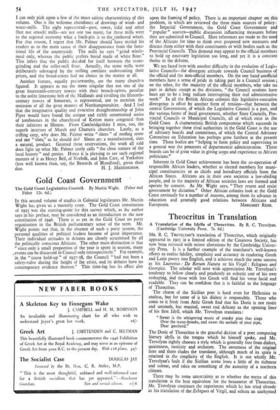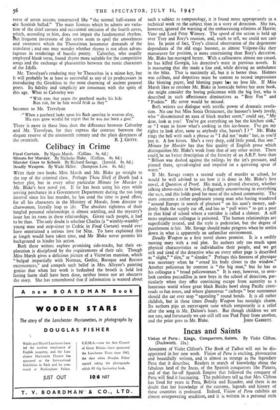Theocritus in Translation
A Translation of the Idylls of Theocritus. By R. C. Trevelyan. (Cambridge University Press. 7s. 6d.)
MR. R. C. TREVELYAN'S translation of Theocritus, which originally appeared in 1925 in a limited edition of the Casanova Society, has now been reissued with minor alterations by the Cambridge Univer- sity Press. It is a further example of the translator's well-known efforts to realise fidelity, simplicity and accuracy in rendering Greek and Latin poetry into English, and it achieves much the same success as his Lucretius : De Rerum Natura or his Virgil : Eclogues and Georgics. The scholar will note with appreciation Mr. Trevelyan's tendency to follow closely and prudently an eclectic text of his own reshaping, and those with less Greek will find his verse lucid and readable. They can be confident that it is faithful to the language of Theocritus.
The charm of the Sicilian poet is hard even for Hellenists to analyse, but for some of it his dialect is responsible. Those who come to it fresh from Attic Greek find that his Doric is not rustic and uncouth, but musical, sweet and delicate as the opening lines' of his first Idyll, which Mr. Trevelyan translates : " Sweet is the whispering music of yonder pine that sings Over the water-brooks, and sweet the melody of your pipe, Dear goatherd."
The Doric of Theocritus is the graceful diction of a poet composing literary idylls in the tongue which he himself spoke, and Mr. Trevelyan rightly chooses a style which is generally free from dialect, quaintness, rusticity and archaism. The sweetness of the original here and there eludes the translator, although much of its spirit is retained in the simplicity of the English. It is not wholly Mr. Trevelyan's fault if the Sicilian scene loses a little of its richness and colour, and takes on something of the austerity of a northern climate.
There may be some uncertainty as to whether the metre of this translation is the best equivalent for the hexameter of Theocritus. Mr. Trevelyan continues the experiment which he has tried already in his translation of the Eclogues of Virgil, and selects an unrhymed
verse of seven accents constructed like " the normal half-stanza of the Scottish ballad." The main licences which he admits are varia- tion of the chief caesura and occasional omission ref the fourth stress,
Butaccording to him, does not impair the fundamental rhythm. But frequent inversions of the stress seem to spoil the smoothness and sweetness which the Theocritean hexameter demands of the translator ; and one may wonder whether rhyme is not often advan- tageous in renderings of bucolic poetry. Calverley, who usually employed blank verse, found rhyme more suitable for the competitive songs and the exchange of pleasantries between the rustic characters of the Idylls.
Mr. Trevelyan's rendering may be Theocritus in a minor key, but it will probably be at least as successful as any of its predecessors in introducing the Greekless to the most charming of ancient pastoral poets. Its fidelity and simplicity are consonant with the spirit of this age. What to Calverley was "With eyes that yearn the goatherd marks his kids Run riot, for he fain would frisk as they " becomes to Mr. Trevelyan - " When a goatherd looks upon his flock sporting in wanton play, His eyes grow wistful for regret that he was not born a goat."
There is more in these lines than the difference between Calverley and Mr. Trevelyan, for they express the contrast between the elegant reserve of the nineteenth century and the plain directness of



































 Previous page
Previous page